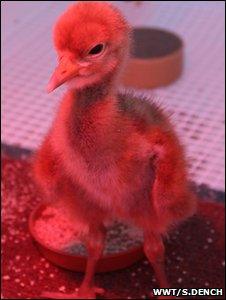Cranes set to return to skies after 400-year absence
- Published
They have been described as "herons on steroids".
Cranes, with their huge eight-feet wingspan, were once a common sight in wetlands across the country.
But in the 1600s, a loss of habitat - coupled with relentless persecution by man - made this charismatic species extinct in Britain.
And that is the way it has been for some 400 years.
In the 1980s, a tiny group of cranes established home in Norfolk. But the population there has struggled to survive, barely reaching anything like sustainable numbers.

The first of the chicks hatched within hours of arriving from Germany
So conservationists have decided to make a concerted effort to bring this striking species back to the British landscape.
In an ordinary looking shed tucked away at one end of the Wetland and Wildfowl Trust (WWT) in Slimbridge, are the first signs that the dream of bringing the cranes "home" is beginning to be realised.
This is the headquarters of The Great Crane Project, and inside they are playing a recorded soundtrack from the German countryside.
This week, the conservationists here are celebrating the fact that crane eggs - which they have brought in from the wild population in Germany - have been successfully hatched.
The soundtrack is designed to make them feel at home.
Nervous times
From these tiny beginnings, it is hoped that a new breeding population of cranes will be established in the Somerset wetlands.
Getting the eggs here was the first challenge. Because of the volcanic ash cloud, they had to be brought into the UK overland.
The first hatch happened within hours of the eggs arriving, which was a nervous times for Nigel Jarrett, WWT's head of breeding and conservation.
"We knew we would be cutting it fine, but we didn't know quite how close it was," he told BBC News.
"It really was a privilege to bring back such an iconic bird to Britain; they are back where they belong, almost like a long-lost friend."
The staff here seem utterly dedicated to the cause. The chicks will be cared for 24/7 by their surrogate parents, who go about their work dressed in baggy outfits and masks so the young cranes will retain their natural fear of humans - which may be crucial to their chances of survival in the wild.
But the task for the WWT is not just about feeding the cranes. It is also about educating them with lessons including how to forage for food, how to respond to danger and how to swim.
Once the chicks are old enough they will be transferred to the care of the RSPB in Somerset.
The plan is to release these first young cranes into the wild late this summer. Another 20 birds will follow in each of the next four years.
Tony Whitehead, the RSPB's spokesman in South-West England, said: "Mission accomplished for me is going to be seeing flocks of wild, flying cranes over the Somerset levels, a sight we haven't seen in well over 400 years."
The crane reintroduction is seen by many conservationists as an important and encouraging indication that the British countryside is now in a fit state to support such an iconic species.